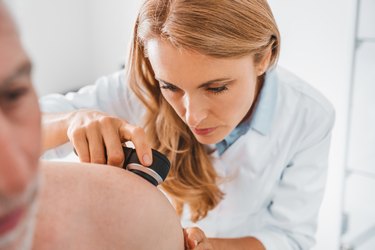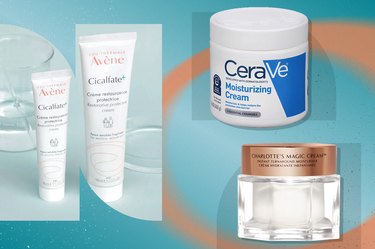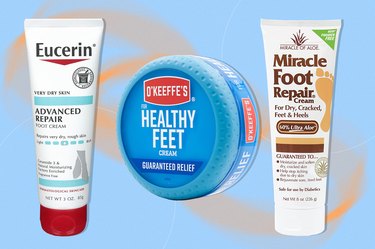
Going to the dermatologist's office for a skin check can be a little nerve-wracking. Not only do many people feel anxious as their derm looks for potential signs of skin cancer, but having to remove all your clothing can make you feel, well, exposed, especially if you haven't seen that particular practitioner before.
Still, it's crucial that your dermatologist gets a good look at your entire body during these appointments, so they can catch any potential skin cancer at an early stage, according to the National Cancer Institute at the National Institutes of Health.
Video of the Day
Video of the Day
Below, we asked dermatologists about the things they wish you'd stop doing at your checkups, plus what to do instead for better skin health.
1. Feeling Embarrassed About Your Body
If you've ever felt insecure about having to take off your clothes for a skin check at your dermatologist's office, you're certainly not alone: This is something derms encounter all the time, they tell us.
"Often, people are embarrassed to schedule with a dermatologist unless they feel that they are 'summer swimsuit season-ready,'" says Maya Thosani, MD, a double board-certified dermatologist and owner of Modern Dermatology in Scottsdale, Arizona.
Many people worry they'll be judged for their body shape, or how their skin or body looks, she adds. As a result, they may hesitate to allow the dermatologist to fully check for skin cancer in private areas.
"If your insecurity prevents your dermatologist from doing a full skin exam for you, then we may miss seeing a skin cancer," Dr. Thosani says. "Not all melanomas grow where the sun shines, and sometimes you can get a skin cancer that has nothing to do with sun exposure."
(In fact, about 10 percent of nonmelanoma skin cancers are not associated with exposure to ultraviolet radiation from the sun, according to the Skin Cancer Foundation.)
And remember: Your dermatologist sees people in their birthday suits all the time. They'll never, ever be judging the way you look.
"I often tell my patients, 'Trust me, we have really seen it all,'" reassures Blair Murphy-Rose, MD, a board-certified cosmetic and medical dermatologist specializing in facial rejuvenation at the Laser & Skin Surgery Center of New York and clinical instructor of dermatology at Weill Cornell Medical College. "We are just happy you came for your skin check to keep you your healthiest."
2. Feeling Like You Need to Shave Before an Appointment
Dermatologists often hear patients say they felt the need to shave prior to a skin check to remove unwanted hair from their legs, underarms or bikini area.
But not only is it totally unnecessary to shave before a dermatologist appointment for aesthetic reasons (again, your derm has seen body hair before — they'll hardly be offended by the sight!), but it can actually make their jobs more difficult.
"Shaving is not helpful, because many times women will come in having rushed to the appointment, and they have shaved and caused some bleeding cuts, which can mimic worrisome lesions," Dr. Thosani says.
If you absolutely have to shave before a skin check, do your best not to rush, and use shaving cream to avoid skin irritation and minimize the risk of cuts. Better yet: Shave a few days before your appointment, and leave things be the day of.
3. Wearing Makeup
As with shaving, some patients feel the need to look "put-together" before a skin check, and this might include applying makeup.
It's also common to schedule a dermatologist appointment first thing in the morning before going to work, in which case patients often want to have makeup on for the day ahead.
The problem? "Makeup can camouflage subtle signs of concerning lesions and hide early skin cancers and pre-cancers," says Dr. Thosani. "If we wait until a cancer is bleeding, then it's already found later than it could have been seen."
Your derm may end up wiping off the makeup you applied to get a better look at your skin, so you'll likely need to reapply anyway.
If you're going to work or a meeting right after your appointment, your best bet is to bring makeup and apply it after the skin check, so your dermatologist can see you fresh-faced.
4. Wearing Nail Polish
While having nail polish on isn't a reason to postpone your skin check appointment, you certainly shouldn't feel like you need to get a manicure and pedicure for your derm's sake.
As with makeup, nail polish can mask the kind of skin abnormalities your dermatologist is looking for so carefully, and it's even possible for skin cancer to develop on the nails.
"Patients often apologize for not having their nails done prior to their visit," says Dr. Murphy-Rose. "Actually, it is better to come without nail polish on so we can evaluate your nail health and check for any concerning lesions there."
Nail polish, especially darker colors, can make it harder to spot anything suspicious, so skip it if you can.
5. Not Moisturizing
While derms overwhelmingly stress that people shouldn't feel the need to do any kind of preparation to their bodies before an appointment, they do recommended applying moisturizer to your face, hands and body if you can.
Why? Moisturizer is actually "a big help" when your dermatologist is examining your skin, Dr. Thosani says.
"I often have patients who have super dry, flaky skin tell me that they 'didn't want to put cream on and hide anything,'" she notes. "However, moisturizer on the skin helps to eliminate the glare from the white dry flakes, and my analogy is that it's like wiping the fog off of a mirror or window."
So, if you have time before your appointment, slather some cream or moisturizer on your face and body (just avoid any tinted formulas, which, like makeup, could disguise a skin abnormality).
6. Not Sharing Your Full Medical History
Going to a new dermatologist who doesn't know your whole history? Make sure you bring your medical files to fill them in on any previous skin abnormalities you may have had, as this can influence your care.
(For example, Dr. Thosani says, if you have a history of invasive melanoma, your practitioner will likely want to check your lymph nodes during the exam to monitor for recurrence.)
Equally important is making sure your derm knows your family's medical history — and not just whether someone on your family tree had skin cancer. The more your doctor knows about your family's history in general, the better they can assess your level of risk.
For example, some genetic mutations run in families that cause a cluster of related issues, Dr. Thosani notes, such as the BRCA gene mutation, which is associated with both breast cancer and melanoma.
"While you might think it's 'just skin' and we don't need to know about all your other medical history, surgical history or medications, we really do," she stresses.
And while you're at it, give your dermatologist a quick rundown about the origins of any scars you have. "Having a scar from a bicycle accident will get less scrutiny than one from a prior melanoma," says Dr. Thosani.
Tip
Give your derm a complete list of any medications you take. Some meds can make you more sensitive to sunlight, increase your risk of skin cancer or lead to other skin side effects that are important for your derm to know about.
7. Lying About Sun Safety
Finally, there's the million-dollar dermatology question: "Do you wear SPF?"
Of course, your derm hopes you're practicing good sun-safety habits, which includes using shade, clothing and sunscreen (at least SPF 30) every day, per the American Academy of Dermatology (AAD). But you're not doing yourself any favors if you don't share exactly how much sun protection you're using.
Your dermatologist needs to be fully aware of the type of sun exposure you've had in order to examine you properly. Say you use tanning booths, for example — your derm will want to examine areas like your buttocks more closely than if those parts of your body had never had sun exposure.
Same goes if you've had a lot of sunburns in the past, or even one or two really bad (read: blistering) sunburns. Your derm really wants to know about those.
"Lying about sun safety can also make it harder for the dermatologist to counsel you on preventative approaches," adds Dr. Thosani. "UV damage tends to build up in the skin like a bank account you can never withdraw from."
Is this an emergency? If you are experiencing serious medical symptoms, please see the National Library of Medicine’s list of signs you need emergency medical attention or call 911.





